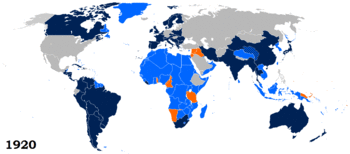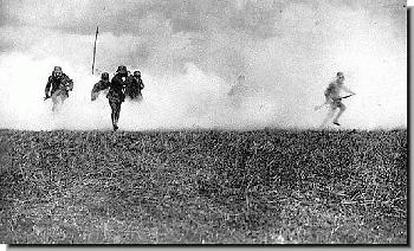The League of Nations: Assuming the Responsibility to Maintain Peace
|
Established in 1920 in response to human rights violations and treaty breaches in WWI, the several major powers formed the League of Nations in attempt to prevent future world war by facilitating diplomatic resolution of international disputes. However, they failed to uphold their promised responsibilities, and were reluctant to take action as the Axis Powers grew aggressive during the 1930s.
Symbol of the League of Nations
(Wikimedia Commons) Dark Blue: Members, Light Blue: Colonies of Members, Orange: Mandates (former territories of Turkey, Germany, and Austria-Hungary)
(Wikimedia Commons) |
How the Manchurian Incident of 1931 highlighted the League's weaknesses
(The Failure of the League of Nations. GCSE FlashBack) Due to constantly fluctuating membership and frequent outbreak of war under the LoN as no country took on the responsibility to negotiate with potential agressors, it was disbanded in 1946.
"It failed ultimately because of the reluctance of nearly all the nations in Europe to proceed to what I might call military sanctions...the real reason, or the main reason, was that we discovered in the process of weeks that there was no country except the aggressor country which was ready for war" - British Prime Minister Stanley Baldwin |
The Leipzig Trials: Failing to Hold Leaders Accountable for War Crimes
German War Crimes in WWIThe Treaty of Versailles punished Germany for violating international agreements and human rights standards during WWI via use of chemical weapons, attacks without warning, etc. by placing severe restrictions on Germany's government and military.
Treaty included provisions for a trial of major German war criminals: |
German chemical attack
(The New York Times) |
"The German Government recognizes the right of the Allied and Associated Powers to bring before military tribunals persons accused of having committed acts in violation of the laws and customs of war. Such persons shall, if found guilty, be sentenced to punishments laid down by law."
|
Excerpt of documentary "Make Germany Pay" explaining some content of the treaty
|
Failure at Leipzig
|
Only 9 of 45 proposed defendants were tried during the 1921 trials; three were found guilty and sentenced to six months in prison. Leipzig was was regarded as a failure to uphold the responsibility of carrying out justice.
|
"As for the war crimes provisions of the Versailles Treaty, the best that can be said is that 'the mountain labored and brought forth a mouse.'" |
|
Reichsgericht building, Leipzig - site of the trial
(Wikimedia Commons) |



